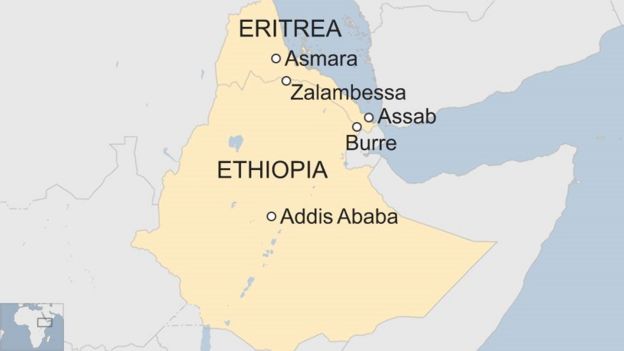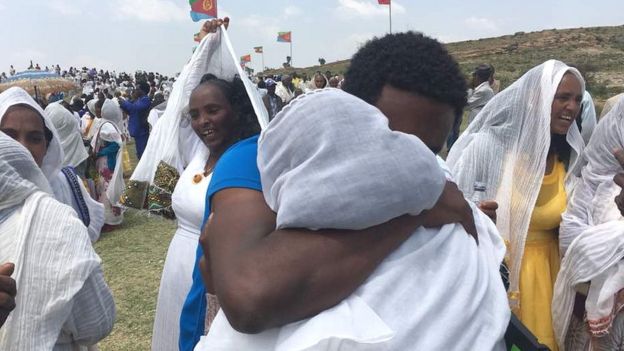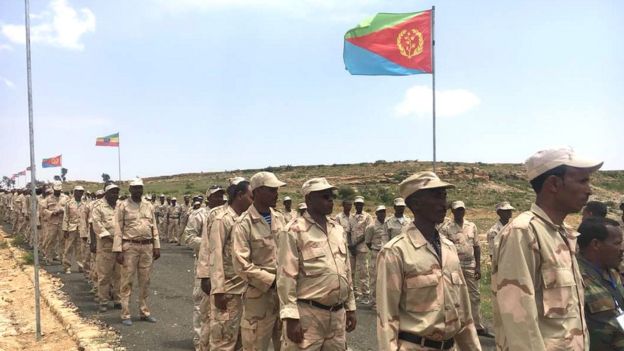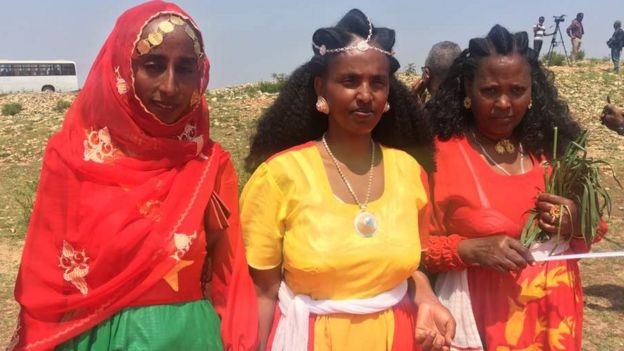Ethiopians and Eritreans have been celebrating the reopening of two key crossing points more than 20 years after a border war shut them.
Hundreds of people from the two countries hugged each other and some wept as their leaders led celebrations to mark the reopening.
It is the latest sign of rapprochement between the former enemies.
Ethiopian Prime Minister Abiy Ahmed and Eritrean President Isaias Afwerki signed a peace deal in July.
It restored diplomatic and trade relations between the nations.
The reopening at Burre gives landlocked Ethiopia access to the sea. Another border post, near the Ethiopian town of Zalambessa, also reopened.

The reopening coincides with the Ethiopian New Year, adding to the festive atmosphere.
The war, fought over the exact location of the boundary between Ethiopia and Eritrea, began in May 1998 and left tens of thousands of people dead.
It ended in 2000 with the signing of the Algiers agreement. But peace was never fully restored as Ethiopia refused to implement a ruling by a border commission established by the agreement.
What is the significance of the reopening?
Families divided by the conflict will be able to go and visit each other after more than two decades.

Ethiopian Yonad Fesseha hugged and kissed his Eritrean cousin
Eritrea won independence from Ethiopia in 1991 but members of the same family continued to live on both sides of the border as the two countries enjoyed good relations until 1998.
Zalambessa resident Yonas Fesseha told the BBC's Tigrinya service that his mother and brother are set to meet for the first time in 20 years. His mother felt as though it was a dream when she heard the news about the reopening, he said.
There is a celebratory mood in the town, he added.

People dressed up to celebrate
The crossing at Zalambessa is on the main trade route linking the capital of Ethiopia's northern Tigray region with Eritrea's capital, Asmara.
Its closure damaged trade, and consequently the economy in the border region suffered.
The reopening of the border at Burre should allow Ethiopia to access Eritrea's southern port of Assab.
What else has changed between the two countries?
This is just the latest in a series of rapid changes as relations between Ethiopia and Eritrea have thawed.

Eritrean troops arrived at the Zalambessa border for the reopening ceremony
In July, Ethiopia's Prime Minister Abiy and Eritrea's President Isaias signed a declaration saying that the state of war between the two countries was over.
Since then, phone calls and flights between the two countries resumed, and last week a ship registered in Ethiopia arrived in an Eritrean port.
The two countries have also reopened their embassies in each others' capital cities.
What will happen at other border crossings?
For now, only the land crossings at Zalambessa and Burre have reopened. The details about other parts of the 1,000km (620 miles) border still need to be worked out.

There is a lot of hope that the Ethiopia-Eritrea rapprochement can change the whole region
The town of Badme, the flashpoint for the 1998-2000 conflict, was ruled to be in Eritrea by the border commission set up by the Algiers peace agreement.
But until recently Ethiopia, which still administers Badme, refused to accept this. That changed when the two leaders met, but the town has not yet been handed to Eritrea.
What happened to Zalambessa during the war?
The border town was one of the main theatres of the conflict.
During the two-year war, Zalambessa was occupied by Eritrean forces and, in the fighting, much of it was destroyed.
But Eritrea has never contested that it is part of Ethiopia and its status is not controversial.

Eritrea's President Isaias Afwerki (l) and Ethiopia's Prime Minister Abiy Ahmed met ahead of the reopening of the border
What other changes have happened in the region?
The rivalry affected the whole region, with Ethiopia and Eritrea normally taking opposite positions whatever the question.
They took rival sides in Somalia's long conflict - Eritrea was accused of backing Islamist groups, while Ethiopia, a US ally, supported the internationally recognised government.
That is now changing and last week Ethiopia, Eritrea and Somalia signed a cooperation agreement to restore peace and stability to the region.
Eritrea and Djibouti also agreed to normalise relations after a dispute over their border had threatened to break out into war.
Latest Stories
-
Ghana drops to 13th in Africa with lowest fuel price
2 minutes -
Hallel Praise: Pastor Edwin Dadson drops medley jam with Joe Mettle
5 minutes -
How Mahama can help save Ghana’s dying textile industry
23 minutes -
Mahama Ayariga to replace Ato Forson as Majority Leader
32 minutes -
Cost of transporting foodstuffs a major contributor to high inflation – GSS reveals
51 minutes -
U.S. Senator wants Ghana to pay off debts to American companies with IMF funding or…
1 hour -
Ghanaian Sakafia Islamic SHS wins the 2025 Zayed Sustainability Prize
2 hours -
Pack of ‘hungry’ dogs kill Nigerian woman in Italy
2 hours -
From the Pitch to the Studio: Joseph Painstil’s Musical Journey
3 hours -
Apaak reaffirms commitment to free tuition for first-year tertiary students
3 hours -
NDC’s free tuition for first-year university students won’t be compulsory – Clement Apaak
3 hours -
ORAL receives over 700 petitions; preparing to submit report to Mahama
3 hours -
Today’s front pages :Thursday, January 16,2025
3 hours -
GIBA seeks mandatory injunction to stop the Ministry of Communications and Digitalization and KNet Ghana Ltd from illegal fee demands
4 hours -
Nsoatreman Coach Yaw Preko awaits Fate after fan invasion at training grounds
4 hours

